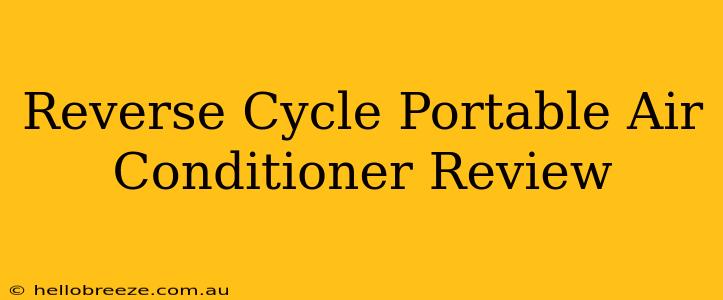Are you tired of battling extreme temperatures in your home? A reverse cycle portable air conditioner might be the perfect solution. These versatile units offer both heating and cooling capabilities, making them an ideal choice for year-round comfort. This review will explore the benefits, features, and considerations to help you decide if a reverse cycle portable air conditioner is right for you.
What is a Reverse Cycle Portable Air Conditioner?
A reverse cycle portable air conditioner, also known as a heat pump, uses a refrigerant to transfer heat. In cooling mode, it absorbs heat from your room and expels it outside. In heating mode, the process is reversed, drawing heat from the outside air and releasing it into your space. This makes them incredibly energy-efficient compared to traditional heaters and air conditioners, as they don't generate heat like electric heaters.
Advantages of Reverse Cycle Portable Air Conditioners:
- Year-Round Comfort: Enjoy cool air in summer and warm air in winter, all from a single unit.
- Energy Efficiency: Reverse cycle technology significantly reduces energy consumption compared to separate heating and cooling systems. Lower electricity bills translate to significant savings over time.
- Portability: Easily move the unit from room to room as needed. This is particularly beneficial for smaller homes or apartments.
- Ease of Installation: No complicated installation is required; simply plug it in and go. This saves on installation costs and time.
- Compact Design: Many models are designed to be compact and aesthetically pleasing, blending seamlessly into various room decors.
- Improved Air Quality: Some models incorporate air filtration systems to remove dust, allergens, and other pollutants from the air, enhancing indoor air quality.
Features to Consider When Choosing a Reverse Cycle Portable Air Conditioner:
- BTU Rating: This indicates the cooling capacity of the unit. Higher BTU ratings are suitable for larger rooms.
- Energy Efficiency Rating (EER): A higher EER signifies greater energy efficiency. Look for models with a high EER rating to minimize energy costs.
- Noise Level: Some units can be noisy, especially when operating at full capacity. Check the decibel rating to ensure it's suitable for your needs.
- Dehumidification Function: This feature removes excess moisture from the air, which is beneficial in humid climates.
- Smart Features: Some models offer smart capabilities, allowing you to control the unit remotely via a smartphone app.
- Size and Weight: Consider the size and weight of the unit to ensure it's easy to move and fits comfortably in your chosen space.
Things to Consider Before Buying:
- Room Size: Determine the size of the room you need to cool or heat to select a unit with an appropriate BTU rating. Underpowered units will struggle to cool/heat effectively, while oversized units can be inefficient.
- Ventilation: Portable air conditioners require proper ventilation. Ensure you have adequate space for the exhaust hose to vent the hot or cold air outside.
- Electrical Requirements: Confirm your electrical outlet can handle the unit's power requirements.
- Maintenance: Regular maintenance, such as cleaning the filters, is essential to maintain optimal performance and extend the unit's lifespan.
Conclusion: Is a Reverse Cycle Portable Air Conditioner Right for You?
Reverse cycle portable air conditioners offer a convenient and energy-efficient solution for managing indoor temperatures year-round. Their portability, ease of installation, and dual heating and cooling capabilities make them a compelling option for many homeowners and renters. By carefully considering the features and factors discussed above, you can choose the perfect model to enhance your comfort and save on energy costs. Remember to carefully assess your needs and budget before making a purchase. A well-chosen reverse cycle portable air conditioner can provide years of reliable and efficient climate control.

